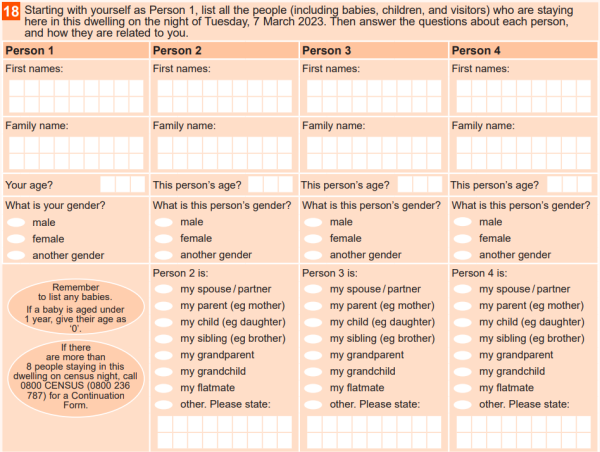What questions are in the 2023 Census
Preview all the questions in the 2023 Census. Each question has information about why we ask it, and some have tips for answering them.
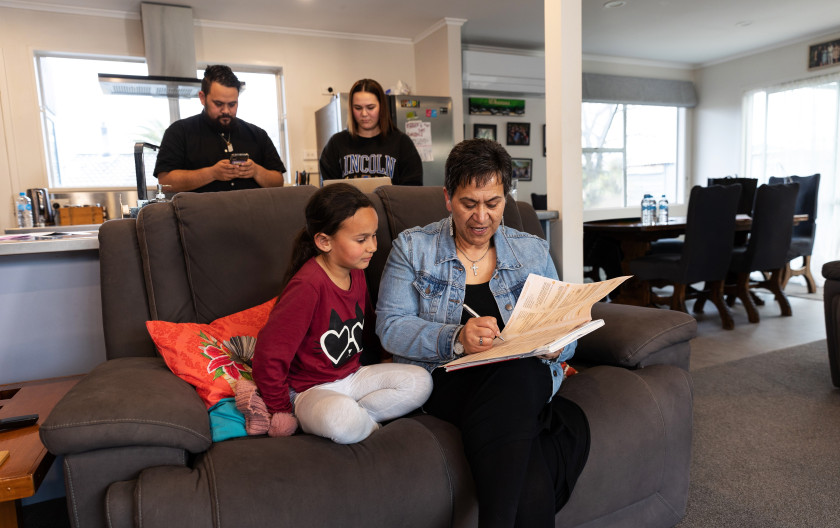
Introduction
On this page:
The 2023 Census questions are in two census forms
- The Dwelling Form is about your dwelling (the place where you live or stay).
- The Individual Form is about you.
If you are staying in a non-private dwelling on census night (somewhere that offers temporary or communal accommodation, such as a hotel, hospital, or retirement home), you will not need to complete a Dwelling Form.
There are online and paper versions of each form, which both ask the same questions
No matter which version you complete, you are asked for the same information.
However, the order and wording of some questions are slightly different in each version. This is because:
- answering a question on a web page is different to answering it on paper (for example, you type instead of write)
- an online form can choose the questions that are relevant to you based on your previous answers (for example, it does not need to ask you about rent if you have already answered that you own your dwelling).
This page includes the questions as they appear in both versions of the forms
These are:
- divided into the sections from the online version of the census forms
- numbered according to the paper version of the census forms.
You will not need to answer all these questions in the census, as some questions apply only to some people or dwellings. For example:
- dwellings which have an owner or part-owner living there do not need to answer questions about rent
- people who do not usually live in New Zealand do not need to answer questions 7 to 9 on the Dwelling Form
- people 14 years or younger do not need to answer questions 25 to 53 on the Individual Form.
- They need to fill in their own Dwelling Form for the granny flat. Please contact us to get an additional access code for them.
- Count them as staying in your dwelling.
- This information is used to produce family and household data.
- We may need to distinguish between people in the household who have the same name.
- The answer to this question helps us work out what type of household you live in (for example, a household with a group of flatmates, or two families).
- answer 'sibling'
- answer 'other', and state what you consider them to be.
- is used for creating the New Zealand Deprivation Index.
- is used to derive household and family projections
- can provide information at the individual level as well as the family or household level. For example, data can be produced that shows the work and labour force status of parents in certain family types, or the ethnicity of people in extended families.
Online form
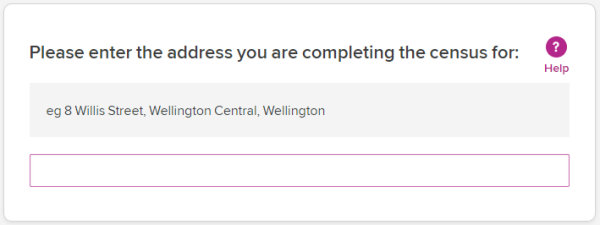
Paper form
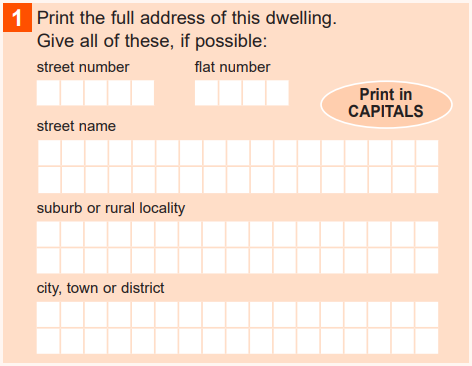
Online form
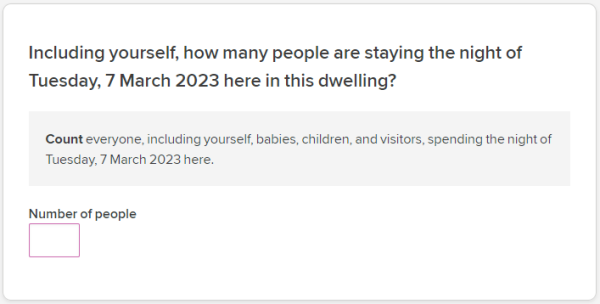
Paper form
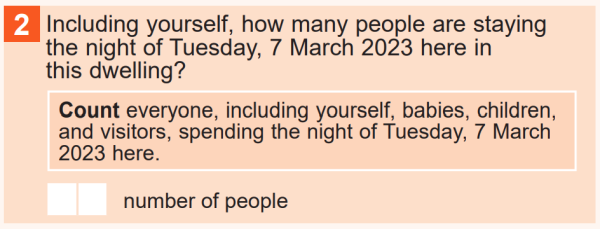
Information about this question
Why we ask for the number of occupants in your dwelling on census night
This information is used to ensure we receive the correct number of Individual Forms from each household.
What I have visitors or boarders staying with me?
Include any visitors or boarders. All people staying at your dwelling must complete an Individual Form.
My spouse is working night shift on census night and will not return home until 3am on 8 March 2023. Do I include them?
Yes.
My child, who usually lives with me, is away on census night. Do I include them?
Not in this list. Include them in the question that asks about people who usually live at your address, but are away (question 20 on the paper form).
My parents use a granny flat on my property. They will be in the granny flat on census night. Do I include them as staying in my dwelling?
If your parents have their own facilities (for example, cooking, dining, and bathroom facilities):
If your parents share your facilities (for example, cooking, dining, and bathroom facilities):
My partner stays here sometimes, but considers their usual residence somewhere else. They are visiting on the night of Tuesday, 7 March 2023. Do I include them?
Not in this list. Include them in your answer to the question about visitors at your address.
Online form
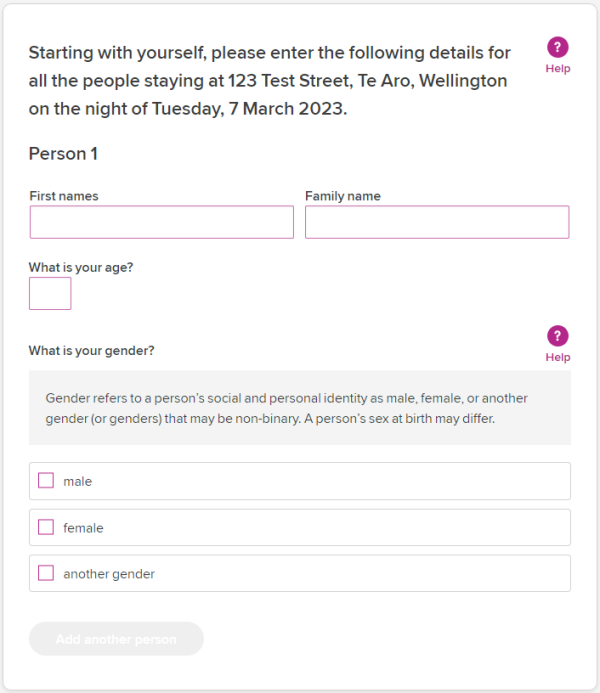
Paper form
Information about this question
Why we ask this question
I do not know the age of someone living in the dwelling. How should I answer?
Ask them their age if you can. If this is not possible, put the age you think they are.
I am legally registered in a civil union to someone else in the dwelling. How should I answer what relationship they are to me?
Answer 'my spouse/partner'.
I am house-sitting, and the owners are not here. How should I answer?
Fill in your details as a person staying at this dwelling.
Do not include the owners in your answer to this question.
My step-sibling/half-sibling/adopted sibling lives with me. How should I answer what relationship they are to me?
If you think of them as your sibling:
If you think of them as something else:
Online form
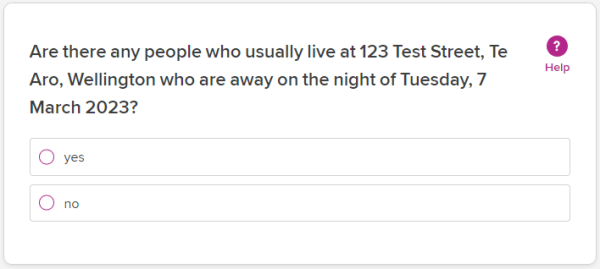 Paper form
Paper form

Information about this question
Why we ask this question
Data from this question:
Paper form
![]()
Information about this question
Why we ask this question
Absentee data is used in conjunction with name and number of census night occupants to help us ensure we have an accurate count of the New Zealand population and families and households. We use information on absentees to help derive household composition, family type, and other family and household topics.
Online form
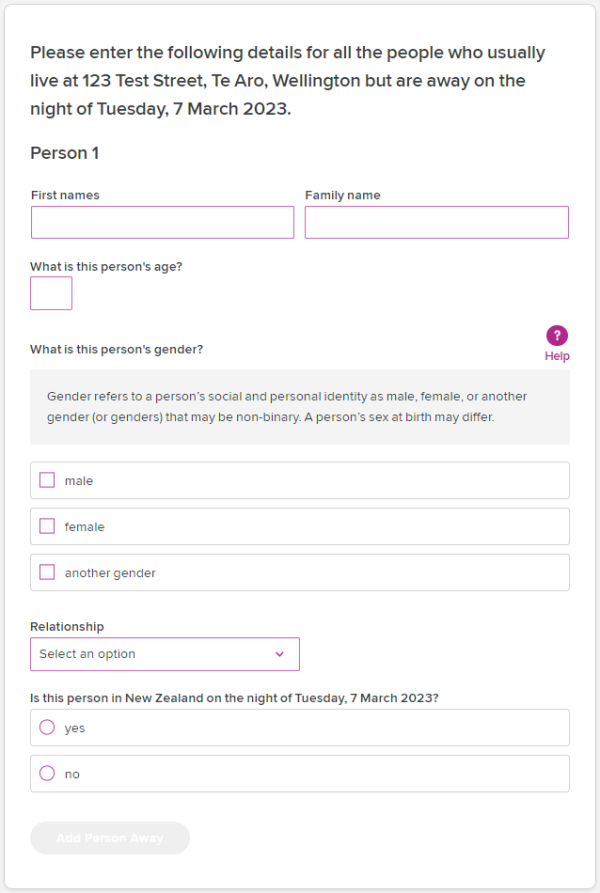
Paper form
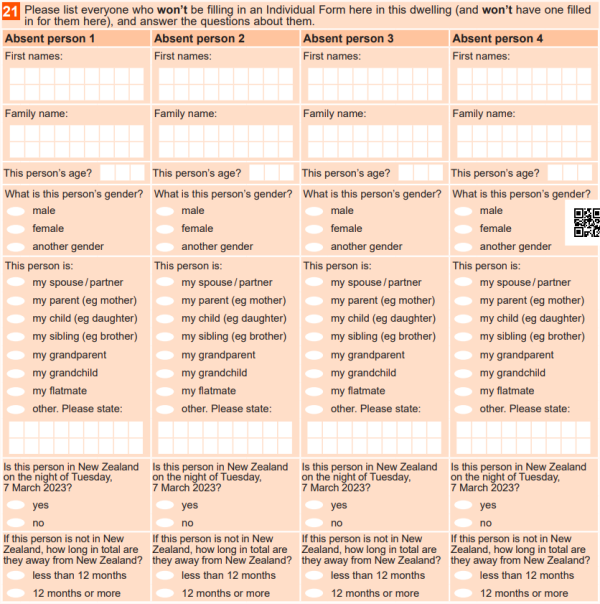
Information about this question
Why we ask this question
Absentee data is used in conjunction with name and number of census night occupants to help us ensure we have an accurate count of the New Zealand population and families and households. We use information on absentees to help derive household composition, family type, and other family and household topics.
- monitoring housing trends
- measuring dwelling density patterns
- planning services
- identifying substandard housing
- measuring severe housing deprivation (homelessness).
- monitoring housing trends
- measuring dwelling density patterns
- planning services
- identifying substandard housing
- measuring severe housing deprivation (homelessness).
- monitoring housing trends
- measuring dwelling density patterns
- planning services
- identifying substandard housing
- measuring severe housing deprivation (homelessness).
- all levels above ground, including carports and garages above ground level
- all levels above ground in apartment buildings, including levels that have shops, businesses, or car parking.
- levels below ground
- split levels
- mezzanine floors.
- monitoring trends and changes in home ownership rates and renting
- developing housing policy.
- you or someone else living here owns the dwelling, even if you don’t own the land
- you purchased the dwelling under unit title, stratum title, or composite leasehold
- you purchased the dwelling under licence to occupy. This may include self-care villas, townhouses, apartments, or units in a retirement complex
- the dwelling you own is a moveable dwelling such as a caravan, boat, tent or motorhome, even if you bought it under hire purchase or some other financial loan agreement.
-
- answer 'hold this dwelling in a family trust'
-
-
-
- answer 'hold this dwelling in a family trust'
-
-
-
-
-
- mark 'neither of these'
-
-
-
-
-
- answer 'own or partly own this dwelling, with or without a mortgage'.
-
-
-
-
-
- answer 'neither of these'
-
-
-
-
-
- answer 'own or partly own this dwelling, with or without a mortgage'.
-
-
-
-
-
- answer 'own or partly own this dwelling, with or without a mortgage'
-
-
-
-
-
- answer 'neither of these'.
-
-
- helps formulate and monitor housing policy
- helps measure changes in housing assistance and the consequences of this
- enables Kāinga Ora to assess whether it is meeting its social objectives as required by law.
- monitor trends and changes in renting
- help develop housing policy.
- estimate the amount of income households have available for other (non-housing) expenditure
- help investigate the adequacy of low-rent homes.
- allows trends and changes in home ownership to be monitored
- helps develop housing policy.
Online form
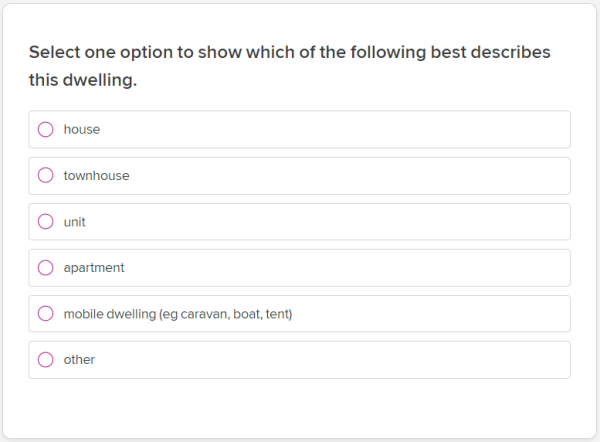
Paper form
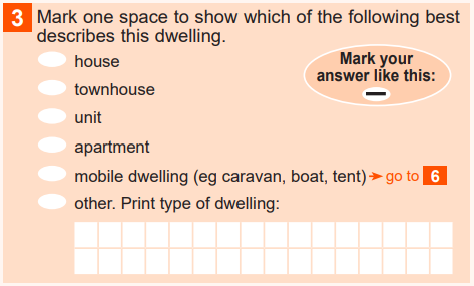
Information about this question
Why we ask you to describe your dwelling
The types of housing people live in help us to work out the dwelling type. Uses of this data include:
Online form
This question will not display if you answered that your dwelling is a 'mobile dwelling'.
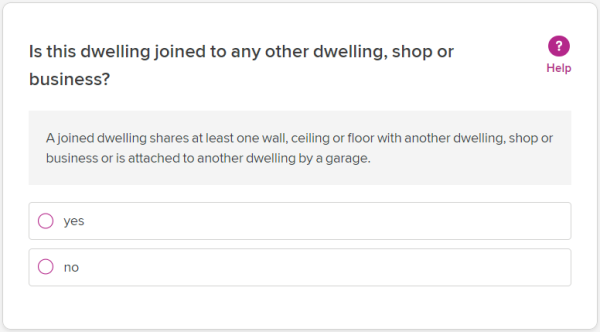
Paper form
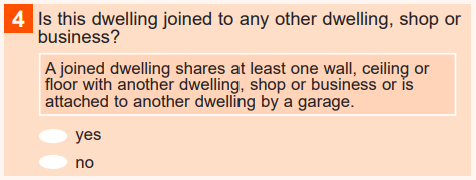
Information about this question
Why we ask if your dwelling is joined to any other dwelling, shop, or business
The types of housing people live in help us to work out the dwelling type. Uses of this data include:
What is a 'joined dwelling'?
A joined dwelling shares at least one wall, ceiling or floor with another dwelling, shop or business or is attached to another dwelling by a garage.
My house is not joined to any other houses. How do I answer the question on joined dwellings?
If your house stands alone and is not attached to another house you should select 'no'.
I live in an apartment building. How should I answer?
You should select 'yes' as this is a joined dwelling.
I live in a self-contained unit in a retirement complex that is joined to other units. How should I answer the question on joined dwellings?
If your unit is self-contained (you have the facilities to prepare your own meals and do your own washing), and is attached to one or more other units, select 'yes'.
Online form
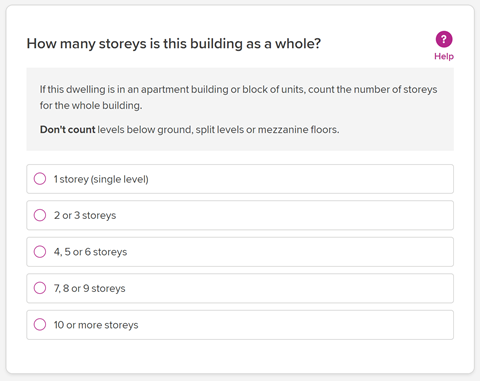
Paper form
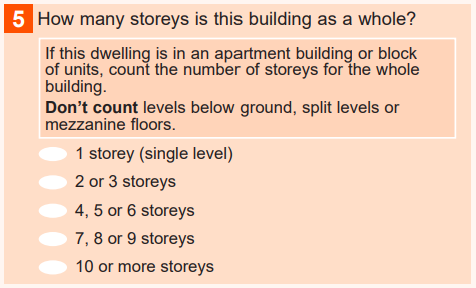
Information about this question
Why we ask for the number of storeys your building has
The types of housing people live in help us to work out the dwelling type. Uses of this data include:
What counts as a storey?
Count:
Don't count
I live in an apartment/block of flats/block of units. How should I answer?
Count the number of storeys for the whole building.
I live above a dairy/shop/business. How should I answer?
Count the total number of storeys in the whole building, including the storey your dwelling is on, and the storey the dairy/shop/business is in.
I live in a dwelling built over a garage that is at ground level. How do I count this?
The garage counts as one storey. Include it when counting the total number of storeys.
Online form
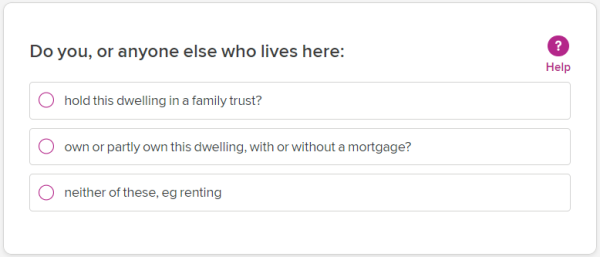
Paper form
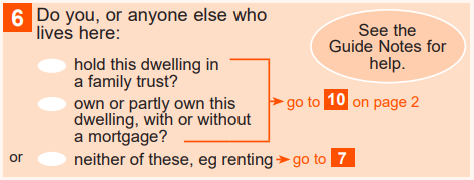
Information about this question
Why we ask this question
Data from this question is important for:
What is a family trust?
A family trust is a special way of owning assets such as a home. The home is owned by a legal entity not an individual or group of people. The family trust arrangement will be set out in a legal document, usually called a trust deed.
If your home is partly in a family trust and partly owned, select 'hold this dwelling in a family trust'.
What counts as owning or partly owning this dwelling?
The following situations count as owning:
Select ‘neither of these’ if you are occupying this dwelling under a rent-to-buy or similar agreement.
Why does licence to occupy count as owning?
Licence to occupy is considered a similar situation to owning and is different from renting. Although legally you own the right to occupy the dwelling not the dwelling itself, the value of the licence to occupy is usually similar to the value of the dwelling.
My parents hold the property in a trust but do not live in the dwelling. How should I answer?
If you are also a trustee of the trust:
If you are a beneficiary and trustee of the trust:
If you are a beneficiary of the trust, but not a trustee:
These answers also apply if the property is held in a trust by the parents or family of anyone else living in the dwelling (for example, a flatmate).
I am living in a house that is currently up for mortgagee sale. How should I answer?
If the title is at least partly in your name, or the name of someone else who lives there:
I am in a rent-to-own scheme. How should I answer?
This is classified as renting. Answer 'neither of these'.
Someone who did live in this dwelling, but no longer does, still pays the mortgage on the house. How should I answer?
If you do not own or partly own the dwelling, and no one living there owns or partly owns it:
If you or someone else living there owns or partly owns the dwelling:
The owner uses my rent payments to pay the mortgage. How should I answer?
If the owner lives in the dwelling:
If the owner does not live in the dwelling:
Online form
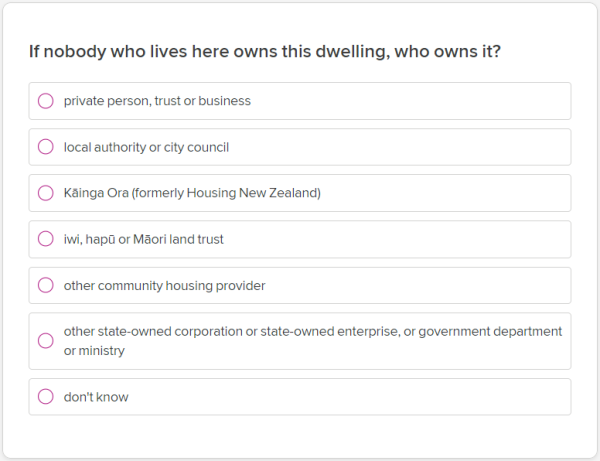
Paper form
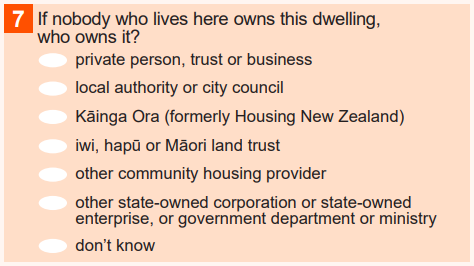
Information about this question
Why we ask this question
Data from this question:
I rent through an agency, but they just manage it for someone. How should I answer?
Answer 'private person, trust, or business'.
Online form
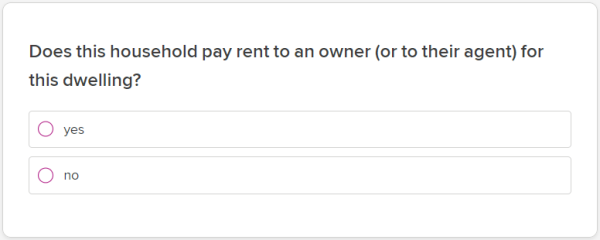
Paper form

Information about this question
Why we ask this question
This question is used to help work out whether a household is renting.
Data from this question is used to:
Some people in my dwelling pay rent to the owner, who does not live here, others live here rent-free. How should I answer?
Select 'yes'.
I pay rent to my flatmate, who owns the house. How should I answer?
If the owner lives in the dwelling, you do not have to answer this question.
Online form
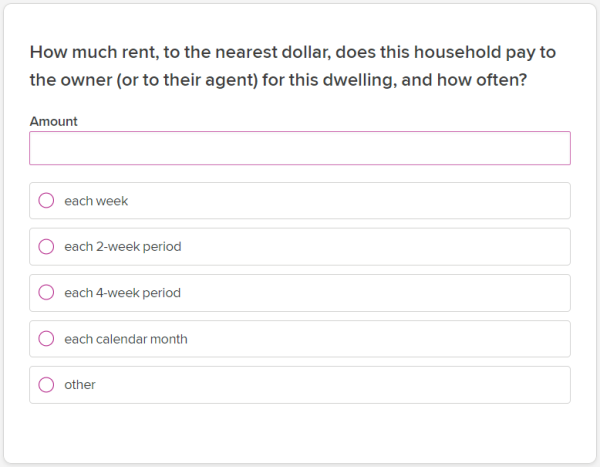
Paper form
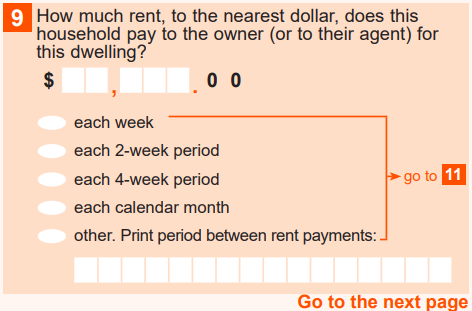
Information about this question
Why we ask this question
Data from this question is used to:
My rent is reduced at the moment. Do I put the full rent I pay normally, or what I am paying at the moment?
Answer what you are paying at the moment.
The rent I pay to the owner includes utilities (for example, power, gas, internet). I do not know how much of what I pay is rent. How should I answer?
Give your best estimate of what the rent amount would be, excluding utilities.
Do I answer with what I pay as rent, or what all of us living here pay as rent in total?
Give the total amount of rent paid to the owner by all people in the dwelling.
I know what rent I pay, but not what others in the dwelling pay. How should I answer?
Try asking the others in the dwelling what they pay. If this is not possible, give your best estimate of the total rent paid.
Online form
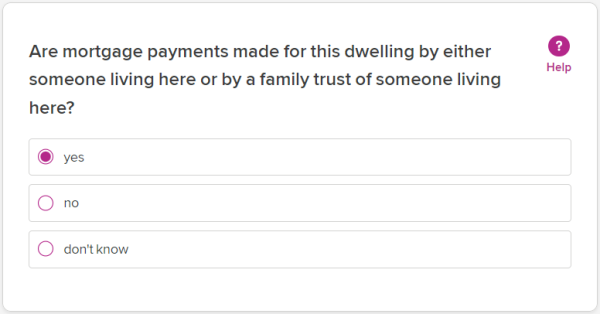
Paper form

Information about this question
Why we ask this question
Data from this question:
I am on a short-term mortgage repayment holiday. How should I answer?
Answer 'yes'.
I have a reverse mortgage/equity release mortgage. How should I answer?
Answer 'no'.
There is a debt for this dwelling, but it is not a mortgage (for example, hire purchase or financial loan for a boat or caravan). How should I answer?
Answer 'no'.
I borrowed money from family members to buy my dwelling, and I make regular repayments to them. How should I answer?
Answer 'yes'. Your mortgage does not have to be with a bank.
I am in a rent-to-own scheme. How should I answer?
Answer 'no'. Rent payments do not count as mortgage payments.
I do not have a mortgage, but someone else living in the dwelling has one for the dwelling. How should I answer?
Answer 'yes'.
The owner normally lives here, but is away at the moment. I do not know if they have a mortgage or not. How should I answer?
Answer 'don't know' if you cannot find out from them.
Someone who used to live here, but no longer does, is still paying mortgage on the dwelling. How should I answer?
Answer 'no'.
I do not have a mortgage on the dwelling in which I live, but I do pay a mortgage on another dwelling. How should I answer?
Answer 'no'. This question is only about the dwelling in which you live now.
- gives some indication of dwelling size, and housing occupancy patterns
- can be used to help estimate future housing demand
- can provide information on household crowding.
- is used with other information to predict energy needs throughout New Zealand, to plan distribution, and to monitor trends in energy efficiency and conservation
- helps monitor air quality and tracking health outcomes and risk factors for respiratory and cardiovascular diseases
- helps identify areas affected by fuel poverty and informs public health interventions
- increases our understanding of changes in energy demands
- helps inform civil defence planning.
- to gather information about a range of communication systems, and therefore various levels of access to flow-on services
- in conjunction with other census topics, as a measure of social connectedness, and a contribution to measures such as the New Zealand Deprivation Index.
- anything that is disconnected or broken
- anything that can be used only for work.
- is used by local government and transport planners to plan transport services
- assists in the location of public transport services, commercial facilities, and welfare facilities
- is used to study energy conservation.
- vehicles belonging to people who usually live here but are temporarily away
- vehicles that are temporarily out of order or under repair
- vehicles that are usable but at the moment have no current registration or warrant of fitness (WoF).
- vehicles that belong to visitors
- vehicles that this household borrows occasionally from another household
- vehicles that can be used only for work or only on the farm
- vehicles likely to be off the road for several months
- vehicles that can be used only for work or only to get to and from work.
- helps develop a better understanding of the state of New Zealand's housing
- can be used to develop initiatives to address housing quality issues, inform public health action, and ensure resources are targeted for maximum benefit
- feeds into legislative requirements of councils, civil defence and emergency management planning, and measurements of severe housing deprivation.
- helps develop a better understanding of the state of New Zealand's housing
- can be used to develop initiatives to address housing quality issues, inform public health action, and ensure resources are targeted for maximum benefit
- feeds into legislative requirements of councils, civil defence and emergency management planning, and measurements of severe housing deprivation.
- on walls, ceilings, floors, doors, window frames, curtains, blinds, in wardrobes or cupboards, behind or under furniture, whiteware etc
- if the total area of combined patches of mould is larger than an A4 sheet of paper
- if the mould reappears after cleaning.
- you can only smell it and cannot see it
- you only have mould on furniture and clothing
- the total area of combined patches of mould is smaller than an A4 sheet of paper.
- answer 'yes'
- answer 'no'.
- helps develop a better understanding of the state of New Zealand's housing
- can be used to develop initiatives to address housing quality issues, inform public health action, and ensure resources are targeted for maximum benefit
- feeds into legislative requirements of councils, civil defence and emergency management planning, and measurements of severe housing deprivation.
Online form
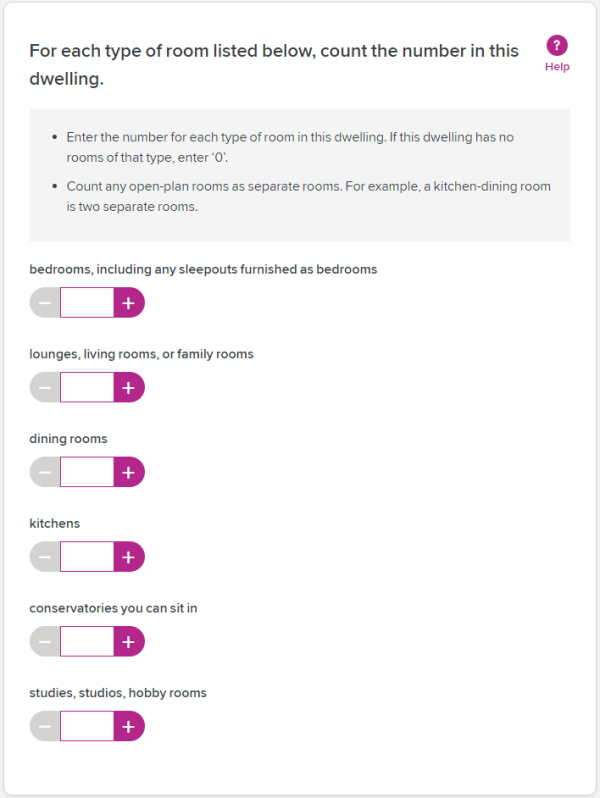
Paper form
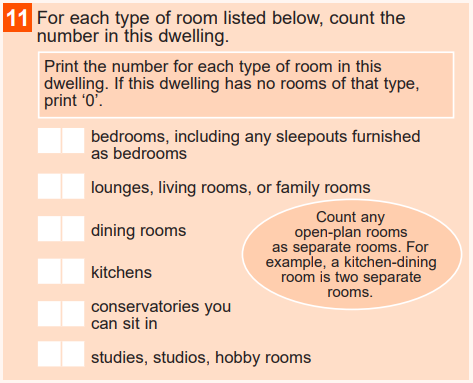
Information about this question
Why we ask this question.
Data from this question:
How should I answer if this is a one-room dwelling, such as a studio unit or studio apartment?
Enter ‘1’ for ‘bedrooms…’ and ‘0’ for all other room types.
How should I answer if my lounge is also used as a bedroom?
Rooms used for more than one purpose should be counted once only.
Count it as a bedroom if there are no other bedrooms in this dwelling.
Count it as a lounge if there are other bedrooms in this dwelling.
Do I count the sleep-out (furnished as a bedroom)?
If the sleep-out is furnished as a bedroom only, and is used regularly or occasionally by members of your household or visitors to your household, please include it in your count of bedrooms.
Do I count the caravan as a bedroom?
If the caravan is next to your home and is used as a bedroom by members of your household who live in the main dwelling, please count it as a bedroom.
If the caravan is used just for holidays, do not count the caravan as a bedroom.
How do I count my attic?
If the attic is not furnished as one of the listed rooms, please do not count it.
If the attic is furnished as one of the listed rooms (for example, bedroom) please count the attic as that type of room.
Online form
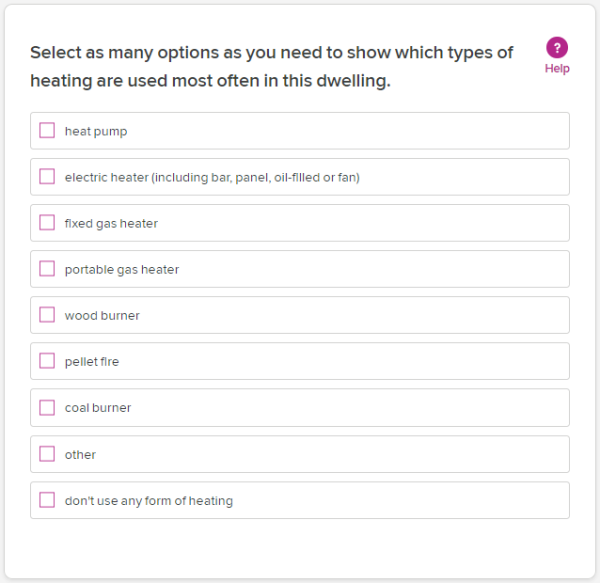
Paper form
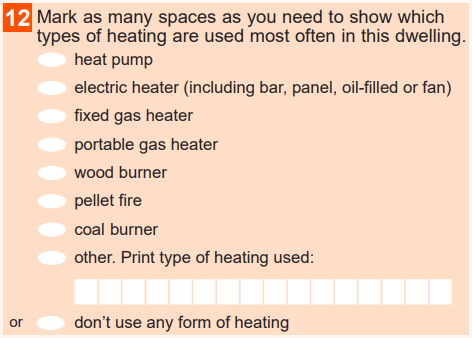
Information about this question
Why do you want to know how my dwelling is heated?
Information on heating in dwellings:
How do I decide what heating types I use most often?
Include the heating types that you use the most when you heat your dwelling. For example, those you use every day or several times a week. Do not include any types of heating that you hardly ever use.
If you only use heating occasionally, select the type or types of heating you use most often on those occasions.
Does the warmth of the sun count as 'other' for heating my dwelling?
No, if you use the sun coming through the window to heat the house, but do not have any equipment for storing and distributing this heat, do not select 'other'.
How should I answer if heating is available in this dwelling but I don't use it?
Select 'don't use any form of heating', if you don't use your heating.
What if my main way to heat the house is not listed?
Select 'other' and enter your answer in the response space provided.
I own one of these appliances, but it is not in the dwelling at the moment. How should I answer?
Answer 'none of these'
I use an oil column heater for heating my home. How should I answer?
Answer 'electric heater'.
I use a gas heater for heating my home. How should I answer?
Answer either 'fixed gas heater' or 'portable gas heater', depending on which kind of gas heater it is.
My gas heater is flued. How should I answer?
Answer 'fixed gas heater'.
My gas heater is unflued. How should I answer?
Answer 'portable gas heater'.
Online form
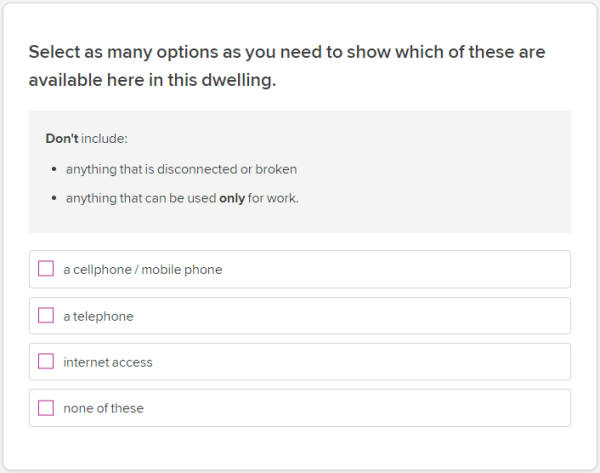
Paper form
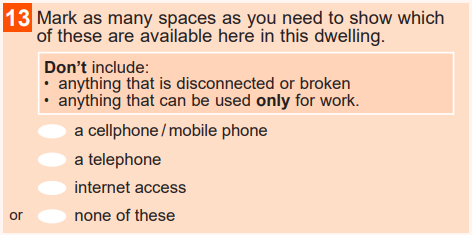
Information about this question
Why we ask this question
Data from this question is used:
Don't include:
Online form
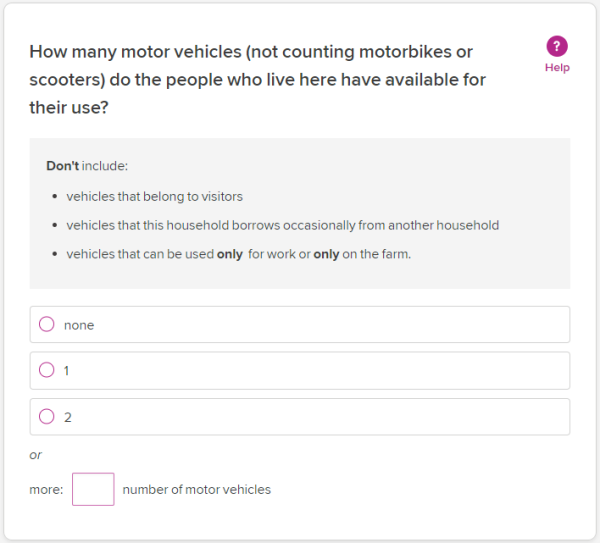
Paper form
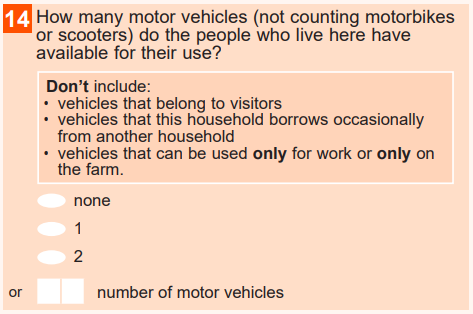
Information about this question
Why we ask this question:
Data from this question:
What vehicles should I count as available for use?
Count:
Don't count:
Why are motorbikes and scooters excluded?
There are limitations on how you can use these forms of transport. For example, motorbikes and scooters may not be suitable transport for some passengers.
I live in a flat, where we each have our own car, and we do not use each other's. How should I answer?
Count all the vehicles at your household, even if each of them is not used by everyone.
There is a car at my dwelling that I do not own, but is usually here and I use it regularly for personal travel. How should I answer?
Count this vehicle.
Online form
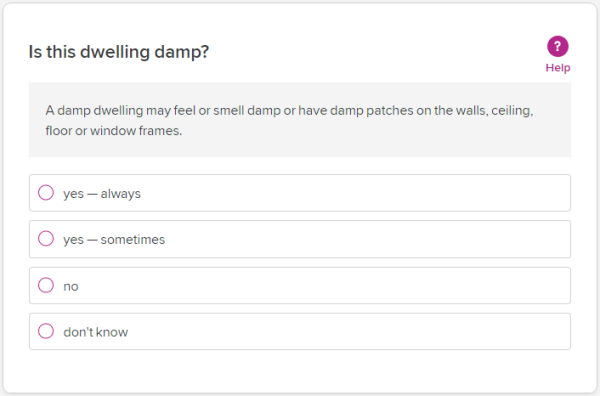
Paper form
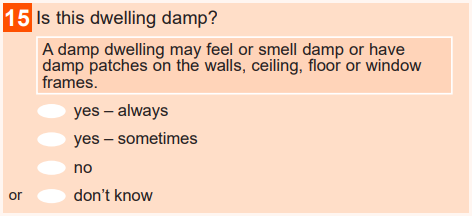
Information about this question
A damp dwelling may feel or smell damp or have damp patches on the walls, ceiling, floor or window frames.
Why we ask this question
Housing quality information:
How do I answer if my bedding or furniture feels or smells damp?
Select one of the ‘yes’ boxes.
Online form
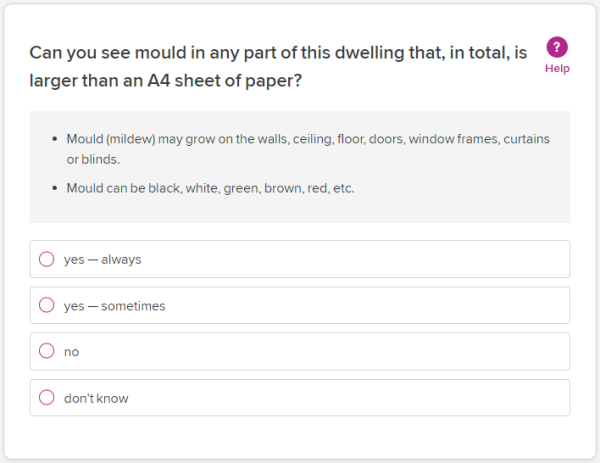
Paper form
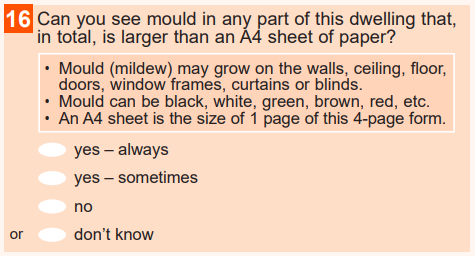
Information about this question
Why do you want to know if there is mould inside my dwelling that is larger than an A4 sheet of paper?
We are asking questions in the census that will help build a picture of housing quality. Collecting information on mould covering an area larger than an A4 sheet of paper is useful for assessing health risks at regional and national levels.
Housing quality information:
If I have mould in my dwelling, what mould should I include / exclude?
Select one of the ‘yes’ boxes if you have mould amounts larger than an A4 size sheet of paper:
Select ‘no’ if:
Should I include mould on furniture and clothing?
No - don't include mould on furniture and clothing.
Should I include mould in my garage or attic?
Yes – include mould in the garage or attic.
How should I answer if I had mould inside my dwelling but have cleaned it off?
Select ‘no’ if the mould has not come back after cleaning and the total amount of any mould in your dwelling is now smaller than an A4 sheet of paper.
Select one of the ‘yes’ boxes if the mould keeps coming back after cleaning and the total amount of all mould in your dwelling is larger than an A4 sheet of paper.
The mould in my home is in several different patches in different rooms/places. How should I answer?
If the total area of all the mould patches combined is larger than an A4 sheet of paper:
If the total area of all the mould patches combined is larger than an A4 sheet of paper:
Online form
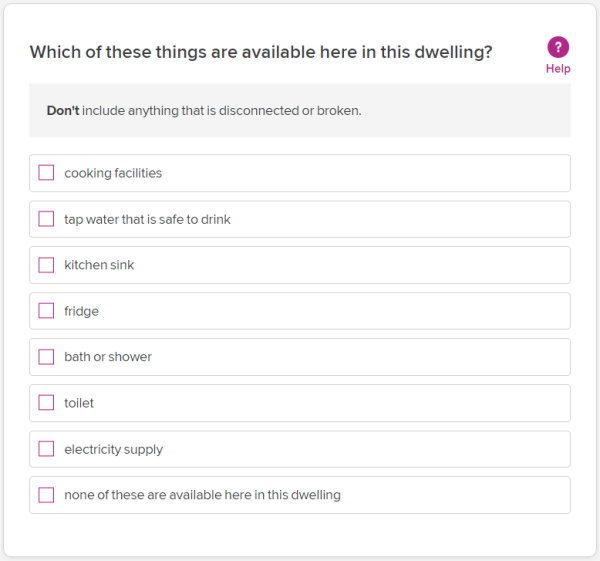
Paper form
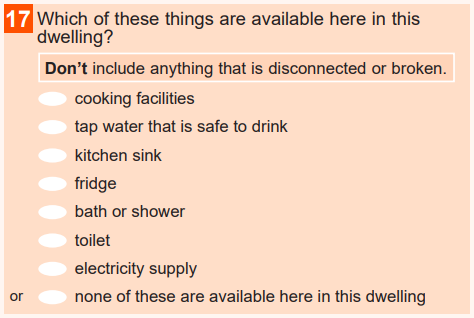
Information about this question
Why we ask this question
Housing quality information:
How should I answer if I have to go outside my dwelling for any of the listed amenities?
Only select what you have inside your dwelling.
Select 'none of these' if none of the things listed are available inside your dwelling.
How should I answer if my bath / shower (or toilet etc) can’t be used at the moment and needs repairs / to be replaced?
Select the box for 'bath or shower' (or 'toilet' etc) if it will be fixed/replaced soon or if you have another bath or shower in your dwelling that can be used.
Do not select the box for 'bath or shower' (or 'toilet', etc) if you have only one and it is likely to remain unusable for several weeks or more.
I have a composting toilet. Should I select ‘toilet’?
Select ‘toilet’ if your composting toilet is in working condition.
My electricity has been disconnected. Should I select ‘electricity supply’?
Do not select ‘electricity supply’ if it is likely to stay disconnected for several weeks or more.
Select ‘electricity supply’ if it will be reconnected soon.
I get electricity supply by using solar power. Does this count as ‘electricity supply’?
Yes – select ‘electricity supply’.
- to match the Individual Forms to the people listed as staying at this dwelling on census night, and to help determine family and household structures
- in the initial matching process when census data is added to the Stats NZ Integrated Data Infrastructure (IDI) research database. Data in the IDI has name, address, and day of birth removed before it is made available for research and analysis.
- If you answer 'in New Zealand', you will be asked to enter the address where you usually live.
- If you answer 'overseas', you will be asked to enter the name of the country where you usually live.
- If you are a primary or secondary school student at boarding school, give your home address.
- If you are a tertiary student, give the address where you live during term.
- If you live in more than one dwelling, give the address of the one you most consider to be your home. If you spend equal amounts of time at different addresses, give only one of those addresses.
- Children in shared care should give the address where you spend most nights. If children spend equal amounts of time at different addresses, they should give only one of those addresses.
- If you will be staying in New Zealand for fewer than 12 months, give your home country.
- a shared culture, such as traditions or ways of doing things, customs, beliefs or language
- a common ancestry or history
- a similar geographic, tribal or clan origin
- used to develop, monitor, and evaluate settlement programmes for immigrants, and analyse their socio-economic and demographic characteristics
- used by government agencies and researchers
- of considerable interest to immigrant groups themselves.
- provides a useful indicator of cultural diversity and aids in planning services
- is used to develop, monitor, and evaluate settlement programmes for migrants.
- answer with the date you arrived in New Zealand for your holiday.
- answer with the date you arrived to live in New Zealand after immigrating.
Online form
This question will confirm what your name is, based on what was entered in the Dwelling Form for your dwelling.
Paper form
Information about this question
Why we ask for your full name
Names are used:
Online form
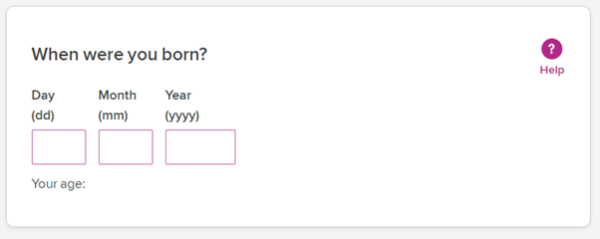
When you enter your date of birth, the form will display the age you are on 7 March 2023.
You cannot change your age. If the age displayed is not correct, please check the date of birth you have entered.
Paper form
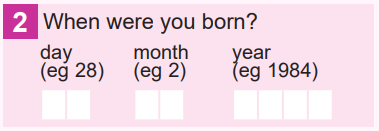
Information about this question
Why we ask when you were born
Age is a key topic for analysis, and is one of the most-used census topics.
Why we ask for your date of birth and not just your age
Your date of birth is more accurate than your age in years.
What to do if you do not know your full date of birth
Please estimate and enter the closest date of birth you can.
Online form
Paper form
Information about this question
Why we ask for your gender
Gender, along with sex, is a fundamental demographic characteristic used in social and population analysis.
Gender will be used in combination with sex at birth (question 4) to derive cisgender (a person whose gender corresponds with their sex at birth) and transgender population data.
What is the difference between gender and sex at birth?
Gender refers to a person's social and personal identity.
Sex at birth refers to the sex that was recorded at a person's birth (for example, on their birth certificate).
A person's gender and sex at birth may differ.
Online form
Paper form
Information about this question
Why we ask for your sex at birth
Collecting both sex at birth and gender data is important for specific purposes, such as population projections, and reflecting the transgender population in statistics. This will provide valuable insights to inform policy and service provisions.
What's the difference between gender and sex at birth?
What is the difference between gender and sex at birth?
Gender refers to a person's social and personal identity.
Sex at birth refers to the sex that was recorded at a person's birth (for example, on their birth certificate).
A person's gender and sex at birth may differ.
Why there is no intersex category
The census collects information on variation of sex characteristics later in the form (Question 30). This is the recommended practice for collecting intersex population data.
If neither ‘male’ nor ‘female’ was recorded on your birth certificate, please provide your gender in the question above and leave the sex at birth question blank.
Online form
This question displays the address from your Dwelling Form.
If you answer 'no', this question will follow.
Paper form
Information about this question
Which address do I give as my usual residence?
If you live in New Zealand or are staying here for 12 months or more, excluding short overseas trips, follow these guidelines to give the right address.
My house is in a rural area and it does not have a street number. What address should I give for my usual residence?
We need to know the actual location of your dwelling so please include the street or road name and rural locality of your house.
Online form
This question will only appear if you give a New Zealand address in Q5: 'Where do you usually live?'
Paper form
Online form
If you are in a private dwelling (a dwelling that completes a Dwelling Form)
You will not see this question online. The address you are at is recorded in the Dwelling Form.
If you are in a non-private dwelling (temporary or communal accommodation; for example, a hotel, hospital, or retirement home)
You will see this question, as your Individual Form is not linked to a Dwelling Form.
Paper form
Online form
Paper form
Information about this question
Why do you want to know about my ethnic group or groups?
Ethnicity statistics show the number of people who identify with different ethnic groups in New Zealand. Understanding where these groups are and how they change over time helps government, businesses and community organisations to plan policies and services in areas such as health and education. People also use this information to learn more about their communities.
An ethnic group is made up of people who have some or all of the following:
Examples of ethnic groups are: Māori, Samoan, Irish, Iraqi, and Filipino.
Online form
If you select 'overseas', you will be asked to enter the current name of the country.
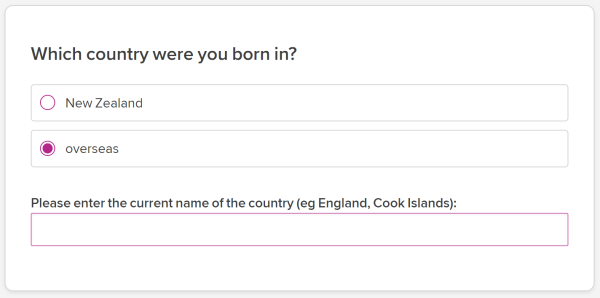
Paper form
Information about this question
Why we ask this question
Birthplace data is:
What do I put if I was born on a boat or ship that was in international waters?
Select 'other' and write 'at sea'.
What do I put if I was born on a plane in transit between countries?
Select 'other' and write 'in flight'.
My country of birth is not listed. Why? How should I answer?
The countries listed are based on the most common countries of birth recorded in the 2018 Census.
If your country is not listed, write the name of your country of birth in the space provided.
What do I put if the country I was born in has changed names?
Put the present name of the country you were born in.
What if I do not know the present name of my country?
Write the name you know it by.
Online form
This question will only display if, in the previous question (Q9), you answered that you were not born in New Zealand.
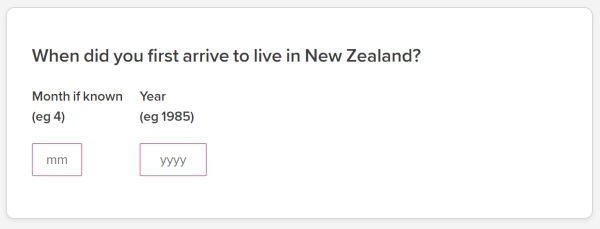
Paper form
Information about this question
Why we ask this question
Data on years since arrival in New Zealand:
I do not know when I first arrived to live in New Zealand. How should I answer?
Give your best estimate of when you first arrived to live in New Zealand.
I came to New Zealand to live here, then left, then returned to live here a second time. How should I answer?
Answer with the date you first arrived to live in New Zealand.
I came to New Zealand for a holiday, stayed awhile, and then decided to immigrate to New Zealand. How should I answer?
If you came for a holiday, then stayed on to live:
If you came for a holiday, left, then immigrated here:
- If you gave a New Zealand address in question 5, go to question 12.
- If not, go to question 54.
- You can provide up to 16 iwi.
- Due to limited space, we are only able to collect five iwi. If you have more than five iwi, please only respond with five iwi, each in a separate field. We may not be able to process responses correctly where more than one iwi is entered in a single field.
- Online: select the 'Help' button to see the list.
- Paper: the list of iwi is in the Guide Notes.
- English-only Guide Notes: the list is on the last page.
- Bilingual Guide Notes: the list is on the middle page.
- critical for producing accurate population estimates, which are a key census output and underpin many key government decisions
- used to find out which areas people are moving from and moving to. Local and central government and other organisations use this information to plan for towns, cities, and rural areas where populations are changing.
- answer 'I lived overseas 1 year ago', and name the country where you were.
- answer with the address you were at in New Zealand, before you went on holiday.
- provides a useful indicator of cultural diversity
- aids in planning services (for example, education, health and welfare services).
- is a primary source of information for helping to understand the health of te reo Māori as a language.
- answer with these languages.
- answer 'none, eg too young to talk'.
- religious, ethnic, and community organisations (for example, to provide welfare services and plan for new churches and religious schools)
- researchers who monitor social changes in culture and identity in New Zealand
- government organisations to help plan policies.
- produce family and household data
- distinguish between people in the household who have the same name
- help us work out what type of household you live in (for example, a household containing a group of flatmates, or two families).
- is attending secondary school, university, polytech, or any other place of learning, and will
- receive a formal qualification that is recognised by the New Zealand Qualifications Authority (NZQA).
- If you spend less than 20 hours a week in class and studying (for example, homework), it is part-time.
- If you spend 20 hours a week or more in class and studying (for example, homework), is is full-time.
- If you are working full-time as an apprentice, answer 'full-time'.
- If you are working part-time as an apprentice, answer 'part-time'.
- provides a measure of the number of people who study at home
- provides a more complete picture of transport patterns in different areas of New Zealand, and supports transport planning work.
- is used primarily for measuring traffic flows and planning transport services
- helps to work out daytime populations in specific areas for civil defence
- is used to tell us whether you are enrolled in an early childhood centre, school, or tertiary institution
- is used in combination with other travel data to give an idea about typical travel flow in New Zealand.
- If you are answering on behalf of someone who is under 5 years old, go to question 23.
- If not, go to question 22.
- helps service providers and local authorities understand and respond to the needs of their communities
- helps local service providers and authorities to understand the risk of exclusion for some community members if there are barriers in their environment.
- If you are 15 years or older, go to question 25.
- If not, go to question 54.
This question is only on the paper form. It redirects you to the relevant next question.
In the online form, you are redirected automatically based on the address you gave in question 5.
Online form
Paper form
Information about this question
Why does census collect Māori descent data?
Descent is a biological concept that differs from ethnicity or cultural affiliation. Māori descent statistics tell us more about the number of New Zealanders who descend from Māori. We collect this information to provide important insight into needs and outcomes for Māori, and to calculate the Māori electoral population and determine the number of Māori electoral districts. The information you provide is kept confidential.
I consider my Māori ancestry to be small (for example, a distant relation). How should I answer?
It does not matter how many Māori ancestors you have, or how distant they are. If you have any Māori ancestry at all, answer 'yes'.
I am of Cook Islands Maori descent - how should I answer the Māori descent question?
If you are of Cook Islands Maori descent, select 'no' unless you are also of New Zealand Māori descent.
What is the difference between 'descent' and 'ethnicity'?
Descent is a biological concept that differs from ethnicity or cultural affiliation.
Online form
If you answer 'yes' to this question, you will be able to select your iwi from a list or type in your iwi name(s).
Paper form
Information about this question
Why we ask if you know the name(s) of your iwi
The census is the most comprehensive source of iwi affiliation information. Iwi information can be combined with other census information to help with understanding outcomes for iwi.
The statistical standard for iwi and iwi-related groups is used by iwi to formalise their iwi status. This is because it is used as the source of official statistics on iwi population numbers for Treaty claims and public policy.
What is an iwi?
An iwi, or Māori tribe, is one of the largest kinship groupings. It is generally made up of several hāpu that are all descended from a common ancestor.
What is a hapū?
Hapū are clusters of whānau, where the whānau is usually an extended family grouping consisting of children, parents, often grandparents, and other closely-related kin.
I do not know the name of my iwi, but I do know the name of my hapū. How should I answer?
Put the name of your hapū in the iwi space, and the region (rohe) where the hapū are tangata whenua.
I do not know the name of my iwi, but I do know the name of the region (rohe) where it claims mana whenua. How should I answer?
Provide this region (rohe) in the region (rohe) field.
I belong to more than one iwi. How should I answer?
You can answer with more than one iwi.
Online:
Paper:
Where can I get a list of iwi?
There is a list online and in the paper Guide Notes. This list is a guide only, and is not exhaustive. Enter your iwi even if it does not appear in the list.
Why can't I provide my iwi if I am not of Māori descent, but I identify with Māori ethnicity? Or if I identify with my iwi, and not as Māori?
Iwi affiliation is based on whakapapa, which we measure through the Māori descent question (Q12).
Ethnicity is a different concept, measured through self-identification.
So those who answer 'no' to the Māori descent question (Q12) are not asked for their iwi.
Online form
Paper form
Information about this question
Why we ask this question
Data from this question is:
I cannot remember my exact address one year ago. How should I answer?
Please provide as much detail about your address as you can (for example, street name, suburb, or locality).
I was in an institution (for example, a prison) one year ago. How should I answer?
Answer with the address you consider was your usual home one year ago.
I was overseas on holiday one year ago. How should I answer?
If you were on holiday for more than 12 months:
If you were on holiday for less than 12 months:
Online form
Paper form
Information about this question
Why we ask this question
Data from this question:
How well do I need to speak a language to include it as a spoken language?
Count languages in which you could have a conversation about a lot of everyday things. You do not need to be speaking the language every day, or even on a regular basis.
A physical disability restricts my ability to speak. How should I answer?
If you can understand and communicate about a lot of everyday things in a language, include that language.
I communicate with a sign language. How should I answer?
If you can have a conversation about a lot of everyday things in New Zealand Sign Language, answer 'New Zealand Sign Language'.
If you can have a conversation about a lot of everyday things in another sign language, select 'other' and enter the name of that sign language.
Do I include languages that I am learning, or that I learnt at school?
Include them if you can have a conversation about a lot of everyday things.
I am completing this form for my child, who is only just starting to talk. How should I answer?
If you feel they do have the ability to have a conversation about a lot of everyday things:
If you feel they do not have the ability to have a conversation about a lot of everyday things:
Online form
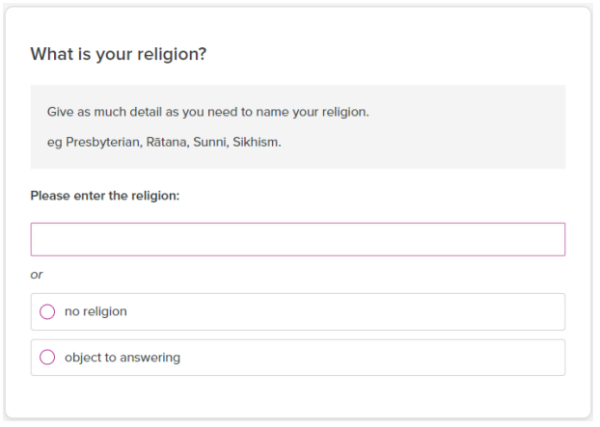
Paper form
Information about this question
Why we ask this question
Data from this question is used by:
I have a religion, but do not want to give it. How should I answer?
Answer 'object to answering'.
I have more than one religion. How should I answer?
Answer with the names of all your religions.
If you are completing the census online, list your religions in the one space provided.
I used to have a religion, but I no longer practise it. How should I answer?
The question is about the religion(s) you have now, rather than any religion(s) you used to have.
It is up to you to decide what religion(s) you feel you have now.
Online form
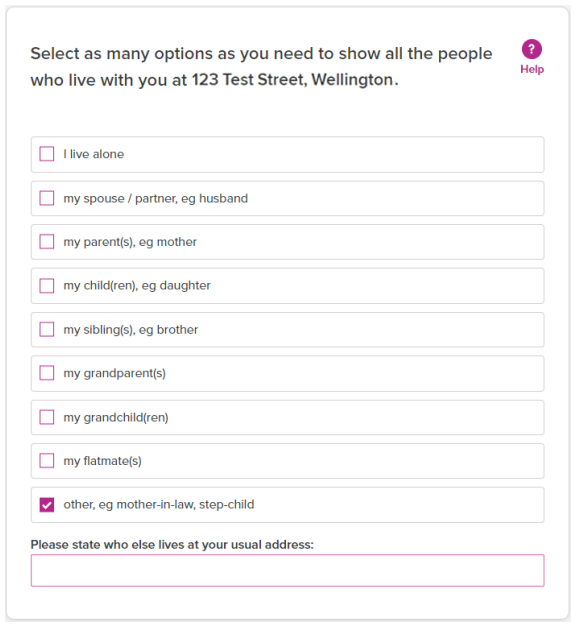
Paper form
Information about this question
Why we ask this question
Data from this question is used to:
One or more of these types of people usually live with me, but are away on census night. How should I answer?
Include them in this answer, because they usually live with you at your usual address.
One or more of these types of people are staying with me on census night, but do not usually live here. How should I answer?
Do not include them in this answer, because they do not usually live with you.
My child is living away from home while they study. How should I answer?
Do not include them in this answer, because they are not considered to be living at the same address as you.
Who counts in each of these options? For example, who counts as a 'spouse/partner', or 'sibling'?
It is up to you to decide which relationships best describe the people you live with.
For example, if you think of someone you live with as a sibling, include them as a 'sibling'.
I have more than one partner. I spend different nights with each of them. How should I answer?
For the census, you can only be a member of one household. If one or more of your partners usually lives in your household, select 'my spouse / partner'.
I live with an ex-spouse or ex-partner, but we are no longer in a relationship. How should I answer?
Include them as 'other', and write how you would describe them (for example, 'ex-spouse' or 'ex-partner').
Online form
Paper form
Information about this question
What do you mean by 'attending, studying, or enrolled'?
This includes anyone who:
What is the difference between part-time and full-time?
I am still at school. How should I answer?
Answer 'full-time'.
I am an apprentice. How should I answer?
Online form
Paper form
Information about this question
Why we ask this question
Data from this question:
Online form
Paper form
Information about this question
Why we ask this question
Data from this question:
This question redirects you to the next relevant question.
Online form
Paper form
Information about this question
Why we ask this question
Data from this question:
The question set and definition of what data will be collected is informed by the Washington Group on Disability Statistics, a group that promotes and co-ordinates ‘international co-operation in the area of health statistics focusing on disability data collection tools suitable for censuses’.
Online form
Paper form
Information about this question
Why we ask this question
This information is required to select the sample for the 2023 New Zealand Disability Survey. It is not used for any other purpose.
What do you mean by long-term condition?
A long-term condition is an ongoing or recurring condition that can have a significant impact on your life. Examples could include autism, chronic pain, heart or lung disease, or learning difficulties. A temporary condition that you expect to make a full recovery from is not considered a long-term condition.
This question redirects you to the next relevant question.
- by those working in the health sector
- to monitor changes in smoking prevalence among the population of New Zealand. This information enables health professionals to understand the profile of smokers, to better target at-risk groups in the community with future health education programmes, and assess the success of ongoing health education programmes.
- as a general health indicator, and increasingly, a flag for population groups that are disproportionately represented in negative well-being and deprivation indicators
- for evaluation of the government's Smokefree 2025 plan.
- by those working in the health sector
- to monitor changes in smoking prevalence among the population of New Zealand. This information enables health professionals to understand the profile of smokers, to better target at-risk groups in the community with future health education programmes, and assess the success of ongoing health education programmes.
- as a general health indicator, and increasingly, a flag for population groups that are disproportionately represented in negative well-being and deprivation indicators
- for evaluation of the government's Smokefree 2025 plan.
- provides valuable information on how society is structured
- allows analysis and understanding of family size and changes in family structures
- is used to derive 'Partnership status in current relationship' which also provides information on how society is structured and allows analysis and understanding of family size and changes in family structures.
- with fertility data, indirectly contributes to the quality of population projections and our understanding of present and future society.
- If you are living with a partner as a couple but are not legally married or registered in a civil union, each of you should mark the answer that fits your own legal marital / civil union status. While long-term ‘de facto’ relationships now have legal rights and obligations, these relationships are not legally registered.
- A marriage formalised by a non-religious ceremony or civil ceremony is not a civil union.
- If you are permanently separated but still married or registered in a civil union, mark ‘I am permanently separated from my legal husband / wife / civil union partner’. You do not need to have gone through any legal separation process.
- is used to study population growth, and the changes in New Zealand's population over time
- helps us to analyse the differences and changes in reproductive patterns and family size and structure in different groups of people.
- helps measure school achievement across New Zealand
- allows school achievement to be cross-tabulated with other demographic and geographic topics collected in the census
- helps monitor how government policies affect skill levels
- is used to examine how much people use their formal qualifications in their employment.
- helps monitor how government policies affect skill levels
- is used to examine how much people use their formal qualifications in their employment.
- is collected to measure qualification achievement across New Zealand
- is combined with highest secondary school qualification to derive the highest qualification topic
- is used in combination with field of study information.
- is combined with level of post-school qualification to identify potential skill gaps in the labour market and to plan education and training programmes
- can help identify mismatches in the economy between people's skills and occupations.
- is used to show what proportion of New Zealand’s skills/qualifications were acquired overseas, for research purposes.
- is combined with level of post-school qualification to identify potential skill gaps in the labour market and to plan education and training programmes
- can help identify mismatches in the economy between people's skills and occupations.
- is used to show what proportion of New Zealand’s skills/qualifications were acquired overseas, for research purposes.
- If you and your spouse / partner earn income jointly, only include your part of that income.
- If you received Working for Families payments (including Family tax credit, In-work tax credit, Minimum family tax credit and Best Start tax credit), mark ‘other government benefits…’.
- If you received homestay or child support payments, mark ‘other sources of income…’.
- If you did piecework, mark ‘wages, salary, commissions, bonuses, etc…’.
- If you and your spouse / partner earn income jointly, only include your part of that income.
- If you received Working for Families payments (including Family tax credit, In-work tax credit, Minimum family tax credit and Best Start tax credit), mark ‘other government benefits…’.
- If you received homestay or child support payments, mark ‘other sources of income…’.
- If you did piecework, mark ‘wages, salary, commissions, bonuses, etc…’.
- you own the dwelling, even if you don’t own the land
- you purchased the dwelling under unit title, stratum title, or composite leasehold
- you purchased the dwelling under licence to occupy. This may include self-care villas, townhouses, apartments, or units in a retirement complex
- the dwelling you own is a moveable dwelling such as a caravan, boat, tent or motorhome, even if you bought it under hire purchase or some other financial loan agreement.
- is used extensively by a variety of organisations, from central and local government to community groups and businesses, to analyse the labour market position of population groups and small geographic areas
- can be used to analyse occupation and industry composition. This includes the size and characteristics of the labour market, links between income, qualifications, and labour market outcomes, and to measure changes over time.
Online form
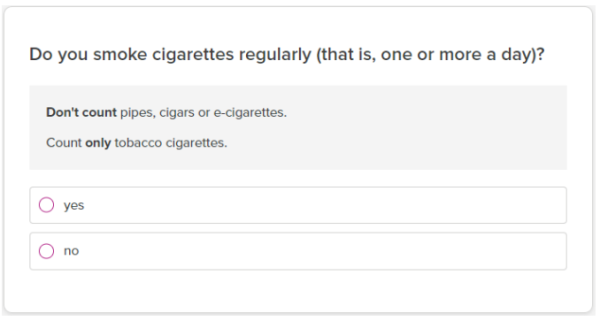
Paper form
Information about this question
Why we ask this question
Data from this question is used:
It was recommended to include smoking data in the 2023 Census because alternative data sources do not provide the level of demographic and geographic detail required by researchers.
Online form
Paper form
Information about this question
Why we ask this question
Data from this question is used:
It was recommended to include smoking data in the 2023 Census because alternative data sources do not provide the level of demographic and geographic detail required by researchers.
Online form
Paper form
Information about this question
Why we ask this question
Data from this question:
What do you mean by legally registered marital / civil union status?
Online form
Paper form
Information about this question
Why we ask this question
Data from this question:
Online form
Paper form
Information about this question
Why do you need information about my sexual identity?
Sexual identity is how a person thinks of their own sexuality and which term(s) they identify with.
Sexual identity statistics will provide service providers, policymakers, and the general public with important insight about how social outcomes vary by sexual identity. This helps inform decisions about funding and service provision. Inclusion of this question will also enable more New Zealanders to see themselves represented in the census.
Online form
Paper form
Information about this question
Why we ask this question
This question enables more New Zealanders to see themselves represented in the census, and it may inform decisions about funding and service provision.
What are variations of sex characteristics?
Variations of sex characteristics (or intersex) refers to genetic, hormonal, or physical sex characteristics that do not conform to medical norms for female or male bodies. People may be born with these characteristics or they may develop in puberty.
Online form
Paper form
Information about this question
Why we ask this question
Data from this question:
Online form
Paper form
Information about this question
Why we ask this question
Data from this question:
Online form
Paper form
Information about this question
Why we ask this question
Data from this question:
Online form
Paper form
Information about this question
Why we ask this question
Data from this question:
Online form
Paper form
Information about this question
Why we ask this question
Data from this question:
Online form
Paper form
Information about this question
Why do you want to know my income?
Income statistics are used for developing social and economic policy, research, and monitoring programmes. The information you provide will be kept confidential.
How do I answer the income question?
Count any payments that are taken out of your income before you get it, such as student loan repayments, union fees, fines, or child support payments.
Don’t count loans (including student loans), inheritances, sale of household or business assets, lottery wins, matrimonial / civil union / de facto property settlements, or one-off lump sum payments.
Don’t count money given by members of the same household to each other. For example, pocket money given to children, or money given for housekeeping expenses by a flatmate. If you know your weekly or fortnightly income after tax, use the table provided to work out your annual income before tax.
Online form
Paper form
Information about this question
Why do you want to know my income?
Income statistics are used for developing social and economic policy, research, and monitoring programmes. The information you provide will be kept confidential.
How do I answer the income question?
Count any payments that are taken out of your income before you get it, such as student loan repayments, union fees, fines, or child support payments.
Don’t count loans (including student loans), inheritances, sale of household or business assets, lottery wins, matrimonial / civil union / de facto property settlements, or one-off lump sum payments.
Don’t count money given by members of the same household to each other. For example, pocket money given to children, or money given for housekeeping expenses by a flatmate. If you know your weekly or fortnightly income after tax, use the table provided to work out your annual income before tax.
Online form
Paper form
Information about this question
What is a family trust?
A family trust is a special way of owning assets such as a home. The home is owned by a legal entity not an individual or group of people. The family trust arrangement will be set out in a legal document, usually called a trust deed. If you partly own your home and it is partly in a family trust, mark ‘hold it in a family trust’.
What counts as owning or partly owning the dwelling I usually live in?
The following situations count as owning:
Mark ‘neither of these’ if you occupy this dwelling under a rent-to-buy or similar agreement.
Why does licence to occupy count as owning?
Licence to occupy is considered a similar situation to owning and is different from renting. Although legally you own the right to occupy the dwelling not the dwelling itself, the value of the licence to occupy is usually similar to the value of the dwelling.
Online form
Paper form
Information about this question
Why we ask this question
Paid work information from the census:
Work and labour force status is also used as a broad indicator of socio-economic status.
- is used extensively by a variety of organisations, from central and local government to community groups and businesses, to analyse the labour market position of population groups and small geographic areas
- can be used to analyse occupation and industry composition. This includes the size and characteristics of the labour market, links between income, qualifications, and labour market outcomes, and to measure changes over time.
- is used extensively by a variety of organisations, from central and local government to community groups and businesses, to analyse the labour market position of population groups and small geographic areas
- can be used to analyse occupation and industry composition. This includes the size and characteristics of the labour market, links between income, qualifications, and labour market outcomes, and to measure changes over time.
- is used extensively by a variety of organisations, from central and local government to community groups and businesses, to analyse the labour market position of population groups and small geographic areas
- can be used to analyse occupation and industry composition. This includes the size and characteristics of the labour market, links between income, qualifications, and labour market outcomes, and to measure changes over time.
- is used for measuring traffic flows and for planning transport services
- helps to work out daytime populations in specific areas for civil defence, and provides a measure of the number of people who work at home.
- local councils and government for town planning and to identify traffic flows on New Zealand's roads
- Civil Defence, for their emergency planning.
- provides indicative information on the nature, characteristics, and location of unpaid activities undertaken
- provides recognition of the importance of work that is unpaid, which makes a significant contribution to the lives of many people in the community
- helps social and government agencies know how much of this work is being done, and whether this is changing over time.
Online form
Paper form
Information about this question
Why we ask this question
Paid work information from the census:
Work and labour force status is also used as a broad indicator of socio-economic status.
Online form
Paper form

Information about this question
Why we ask this question
Paid work information from the census:
Work and labour force status is also used as a broad indicator of socio-economic status.
Online form
Paper form
Information about this question
Why we ask this question
Paid work information from the census:
Work and labour force status is also used as a broad indicator of socio-economic status.
Online form
Paper form
Information about this question
Why we ask this question
We use your employer's name to help us work out which industry and sector you work in. We do not contact your employer. We do not release or share personal information.
Online form
Paper form
Information about this question
Why we ask this question
Your answer helps us determine the industry you work in.
Online form
Paper form
Information about this question
Why we ask this question
Data from this question:
Online form
Paper form
Information about this question
Why we ask this question
Data from this question is used by:
Online form
Paper form
Online form
Paper form
Online form
Paper form
Online form
Paper form
Information about this question
Why we ask this question
Data from this question:
Online form
Paper form
Information about this question
Why we ask this question
We ask this to contact you if you are selected for the follow-up survey after the census.
Online form
Paper form
Information about this question
Why we ask this question
You have to sign paper forms because the census forms are legal documents, and any official document should be signed by the person who completes it.
The ‘Declaration’ tick-box on the online form is equal to a signature.
